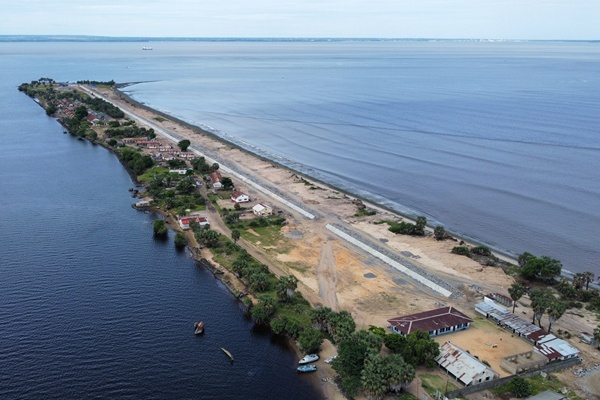DP World entrusted Mota-Engil, a Portuguese firm, with the project to build the Banana deepwater port in the Democratic Republic of Congo (DRC). DP World announced this in a press release on March 20, 2025.
Several international media outlets reported that Mota-Engil revealed that its subsidiary, Mota-Engil Africa, signed a €230 million ($250 million) agreement for the first phase of development. This phase includes constructing a 600-meter quay with an 18-meter draft capable of handling the world’s largest vessels, a 30-hectare storage area, and an annual capacity of 450,000 TEUs (twenty-foot equivalent units).
Construction has already made progress on some components. Expobéton reported that by June 2023, 88% of the protective breakwater had been completed. This may explain why the current contract value for Mota-Engil’s scope is lower than the initial estimates of $350 million for this phase.
The project is being developed as part of a public-private partnership between DP World and the Congolese government. Under the agreement, initially signed in March 2018 and revised in December 2021, DP World provides financing and technical expertise while the DRC government provides land, supporting infrastructure like the Banana-Matadi road, tax exemptions, and partial funding. The overall cost of the port is estimated at $1.3 billion. The concession agreement between the Emirati firm and the Congolese group is valid for 30 years, extendable to 50 years.
To develop the project, the two partners have set up a joint venture, which DP World controls with a 70% stake. The Congolese government holds the remaining 30%.
A world-class port
Work on the Banana deepwater port project began in 2022 but was significantly delayed before halting in 2024 due to "technical and financial disputes," according to Expobéton. A breakthrough came in September 2024 when Deputy Prime Minister Jean-Pierre Bemba led a meeting that resolved the impasse, allowing construction to resume the following month. However, the current status of the project remains unclear, and the completion of its first phase, originally scheduled for 2025, is still uncertain.
Following the recent signing of a $250 million contract with Mota-Engil for the port's development, DP World Chairman and CEO Sultan Ahmed bin Sulayem reaffirmed his company’s commitment to delivering "world-class infrastructure." He stated, "By partnering with Mota-Engil, we guarantee that this world-class infrastructure will be built to the highest standards, promoting economic growth and creating new opportunities for the Congolese population." Carlos Mota Santos, President of Mota-Engil, highlighted that the agreement "demonstrates the recognition and confidence that one of the world's largest port operators places in Mota-Engil."
Mota-Engil brings extensive experience to the project, including its operations at ports along Lake Malawi and its involvement in Angola’s Lobito rail corridor. However, some observers view the Lobito corridor, which facilitates Congolese mineral exports through Angola, as a potential competitor to Banana Port's future role as a logistics hub.
Strategically vital for the DRC, Banana Port will provide the country with its first direct access to the Atlantic Ocean, reducing reliance on neighboring ports such as Pointe-Noire (Republic of Congo) and Matadi. The port is expected to integrate the DRC into major global shipping routes while boosting trade sovereignty.
This article was initially published in French by Pierre Mukoko and Timothée Manoke (intern)
Edited in English by Ola Schad Akinocho










